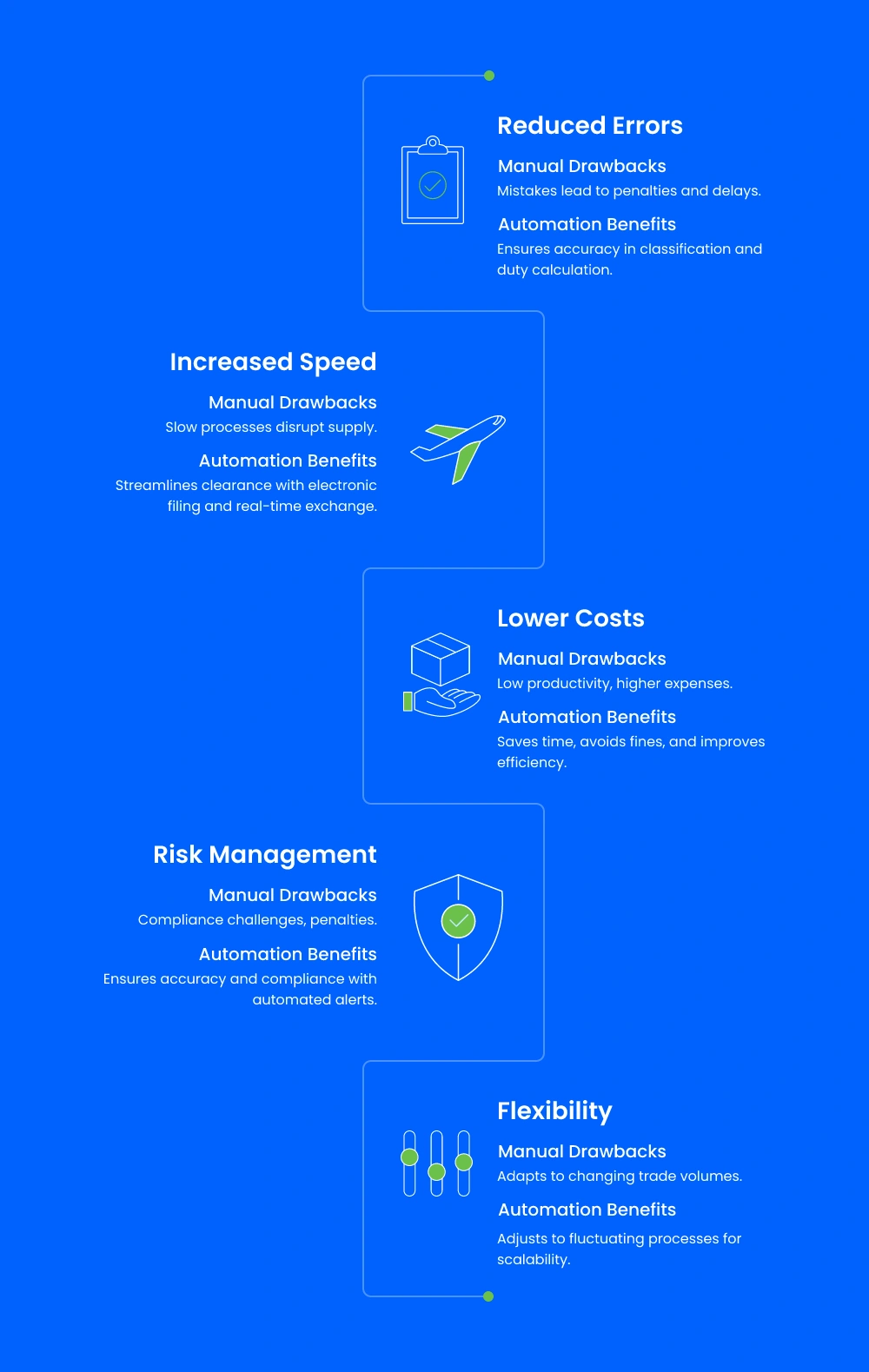Fast & Accurate ENS GB & EU ICS2 Solutions Built for You.
5 Reasons Every Global Trader Needs Workflow Automation
-
Freya Jane
- Director of Customer's Success
Global traders encounter a wide range of difficulties in today’s complex customs environment. The customs process may be daunting, requiring one to manage both complicated laws and interruptions brought on by global occurrences. However, there is a potent technology that may transform how traders manage customs: workflow automation.
According to an analysis, “Workflow automation, according to 70% of business owners, can help them grow their operations.
Success in international trade depends on efficient processes and efficiency. As global supply chains become increasingly intertwined, the demand for smooth customs procedures has never been stronger. Let’s examine the benefits of intelligent document processing and AI workflow automation for international traders, emphasising the role it plays in customs.
5 reasons workflow automation is essential for global traders

1. Reduced mistakes and increased precision
The drawbacks of manual procedures
Manual data input and document processing are prone to mistakes. These errors, which might include mistyping a digit in an invoice number or misclassifying a product code, can have serious consequences. Incorrect information may result in penalties, delays, and even cargo rejections.
How automated workflow reduces mistakes:
Workflow automation takes the human element out of repetitive operations. Traders can guarantee data accuracy by utilising software to arrange and automate intricate customs procedures. Here’s how automation might be useful:
- HS code classification: By precisely classifying items using the HS codes, automated systems can lower the possibility of product misclassification.
- Duty computations: Automation guarantees accurate duty calculations, avoiding under- or overpayment.
- Document verification: Workflow automation software ensures that shipping documents are accurate and minimises inconsistencies.
2. Increased Speed and Effectiveness
The time-intensive nature of conventional customs procedures
Manual customs processes entail communication back and forth, phone conversations, and paperwork. The effectiveness of the supply chain can be impacted by clearance times, which can range from days to weeks.
Using business automation workflow to simplify work
Automated procedures make customs clearance faster. Among the examples are:
- Automated entry filing: Customs declarations can be electronically submitted by traders, cutting down on processing time.
- Document pre-submission checks: Automation validates document accuracy prior to submission, preventing delays.
- Real-time data exchange: Automated solutions provide smooth communication between dealers, customs officials, and logistical suppliers, streamlining logistics operations.
3. Lower expenses and enhanced profitability
The hidden costs of manual work
- Reduced productivity: Manual customs processes include paperwork, lengthy delays in communication, and repeated duties. Employees waste considerable time on administrative tasks rather than strategic tasks.
- Delays: When packages are late because of human processes, it affects sales and makes customers unpleasant. Delays might result in missed market opportunities and contract fines.
- Errors: Inaccuracies in data input, categorisation, or documentation can lead to penalties, refused deliveries, and prolonged processing times.
How automation handles these difficulties
- Labour hours saved: Customs document workflow automation frees up employees from repetitive tasks. For example, automatic data input and document verification eliminates the need for human involvement.
- Avoiding fines: Precise compliance reduces the possibility of facing fines. Automation makes ensuring that documentation, duty computations, and customs declarations all adhere to legal standards.
- Operational efficiency: By putting automated operations in place, businesses may reduce application portfolio expenses by as much as 50%. These cost savings are the result of shorter hours, fewer mistakes, and more efficient procedures.
4. Enhanced risk management and compliance
Handling complicated regulations
The laws governing customs are always changing. Failure to comply may lead to penalties, shipping delays, or legal consequences. Traders have to keep up with the latest developments and follow the evolving rules.
Ensuring adherence to automation
- Automated documentation: The risk of non-compliance is minimised by producing accurate customs documents through the role of AI in the documentation.
- Audit trails: Automated systems keep thorough records of each transaction to guarantee accountability and transparency.
- Data validation: By comparing data to regulatory criteria, automation technologies help to ensure that no incorrect or incomplete information is submitted.
- Automated alerts: Traders get instant alerts regarding regulatory changes, compliance deadlines, and missing documents.
5. Enhanced Flexibility and Scalability
Handling variable trade volumes
The dynamic nature of global trade may lead to unpredictable moves in trade volumes, which can be caused by a range of causes, including changes in market demand, geopolitical events, or economic volatility. Global traders need to be ready to manage abrupt spikes or dips in trading activity without sacrificing effectiveness or level of service.
Automation's adaptation to changing volumes and processes
Automation systems provide a reliable solution to the problem of shifting trade volumes by allowing them to adapt to changing procedures and workloads. In contrast to manual processes, which could find it difficult to cope with abrupt increases in demand or decreases in activity, automation can quickly scale up or down activities as necessary. Automation guarantees that the procedures for clearing customs remain smooth and efficient, regardless of the volume of incoming freight being processed.
Using cloud-based products to increase scalability
An extra degree of scalability is provided by cloud-based automation systems, which enable international traders to dynamically modify their resources in response to shifting demand. Without having to make expensive infrastructure or hardware expenditures, businesses may simply scale their automation capabilities up or down according to trade volumes by utilising the elasticity of cloud infrastructure. Because of this flexibility, traders can maximise efficiency, allocate resources effectively, and react rapidly to shifting market circumstances.
The bottom line
To sum up, workflow automation has several advantages for international traders, especially when it comes to improving customs efficiency. Traders can benefit from increased accuracy, speed, cost-effectiveness, compliance, and flexibility in customs administration by automating repetitive operations and optimising procedures.
Ready to transform your customs management? Modern software solutions from iCustoms are available to improve productivity and expedite your customs processes. With features customised to meet business needs and assistance that leads the industry, iCustoms is your go-to partner for successful international trading. Don’t miss out; visit this link to find out more and schedule a customised demo right now!
FAQ's
What is Workflow Automation, and why is it essential for global traders?
Workflow automation streamlines operations and procedures, which is essential for international traders to guarantee compliance, cut down on mistakes, and increase productivity.
How does Workflow Automation benefit global traders in terms of time savings?
Workflow Automation saves time by expediting customs procedures, allowing for electronic filing, and facilitating real-time communication.
Can Workflow Automation adapt to the diverse needs of different global trading processes?
Yes, Workflow Automation provides customisable workflows to meet various trading requirements, ensuring adaptability and effectiveness.
How does Workflow Automation contribute to cost savings for global traders?
Workflow automation saves money by reducing human labour, avoiding penalties via compliance, and increasing operational efficiency.
You may also like:
Struggling to Extract, Catagorise & Validate Your Documents?
Capture & Upload Data in Seconds with AI & Machine Learning
Subscribe to our Newsletter
About iCustoms
Struggling to Extract, Catagorise & Validate Your Documents?
Capture & Upload Data in Seconds with AI & Machine Learning

